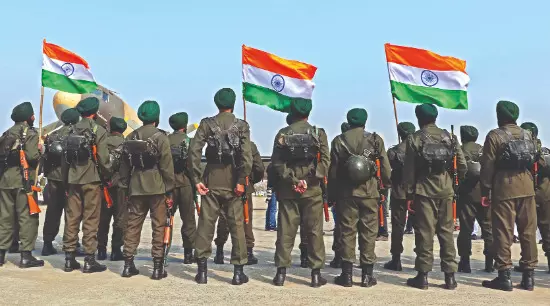Honour Beyond Medals
India’s jawans, the unyielding pillars of national security, turn sacrifice into resilience and courage into victory — a legacy we now celebrate, writes Gautam Mukherjee

Victories in battle are often credited to governments, while the losses are carried silently by the soldiers who fight them. For decades, India’s jawans fighting on two unforgiving frontlines — against terror in Kashmir and against internal security threats in the forests of Bastar — have shouldered the weight of sacrifice without expecting applause. But under Prime Minister Narendra Modi and Home Minister Amit Shah, the nation is beginning to change the way it acknowledges its protectors.
For years, these battles were fought in anonymity. Counter-insurgency operations in Kashmir or anti-Naxal campaigns in central India rarely carried the names or faces of those who executed them. Their successes were reduced to statistics, their sacrifices recorded in brief after-action notes. But the shift is now visible: when Amit Shah draped shawls over the shoulders of soldiers, commandos, and police officers, the message was clear — the victories of the nation are the victories of its jawans. The recent felicitation of personnel involved in Operation Mahadev and Operation Black Forest marked not just a symbolic gesture, but a deeper recognition that India’s security is built on the courage of its jawans.
Operation Mahadev was launched in response to the April 22 attack in Pahalgam, where 26 tourists lost their lives at the hands of three Lashkar-e-Taiba operatives. What followed was weeks of coordinated intelligence gathering and careful planning. On July 28, the perpetrators were eliminated in a joint operation by the Army, CRPF, and Jammu and Kashmir Police — bringing a measure of justice to the families who had lost loved ones. The operation also sent out a clear message: acts of terror will not go unanswered, and those who target innocents will eventually be held to account.
In Chhattisgarh, security forces were engaged in another long-standing challenge — the fight against Naxal violence. Operation Black Forest, the country’s longest continuous anti-Naxal campaign, succeeded in dismantling a key Maoist base in the region. The operation also carried historic significance. It brought closure to the 2010 Dantewada massacre, when 76 CRPF personnel were ambushed and killed, one of the darkest moments in India’s fight against Naxalism. By neutralising Nambala Keshav Rao, believed to be the mastermind behind the massacre, the security forces restored confidence in their ability to pursue justice even when delayed by years.
At the felicitation ceremonies that followed, Amit Shah did not merely hand over tokens of gratitude. He stood before the men and women who make India’s security possible and declared their bravery a “golden chapter” in the nation’s history. In doing so, he shifted the spotlight away from political leadership and placed it firmly where it belonged — on the personnel whose names are too often lost in after-action reports. This shift matters because it reframes security not as a matter of policy alone, but as the outcome of countless individual acts of courage.
Recognition, however, is not just ceremonial. In recent years, initiatives such as Ayushman CAPF, enhanced risk allowances, ex-gratia payments, pensions, and scholarships for children of personnel have created a safety net that extends far beyond the battlefield. These measures may not make headlines, but for families of serving and retired personnel, they represent dignity, stability, and reassurance. From healthcare to housing, from insurance to education, the government has sought to ensure that when a jawan risks his life for the nation, his family is never left to stand alone.
The results of this sustained approach are visible on the ground. Terror incidents in Kashmir have dropped by 70 per cent over the last decade, Naxal-affected districts are at a historic low, and overall violence is steadily declining. Yet numbers tell only part of the story. The real transformation lies in acknowledging that behind every percentage point of decline are jawans who march into danger so that others can live in peace. Their contribution is no longer relegated to the margins of official reports, but increasingly forms the heart of the national security narrative.
By bringing these personnel into the public eye and honouring them not as faceless units of a larger machine but as individuals who embody courage, the Modi–Shah leadership is shaping a new narrative. One where the jawan is not just an instrument of security, but the very heart of it.
Views expressed are personal. The writer is a political analyst and columnist. He regularly writes for different national dailies and participates as a panellist on news channels



